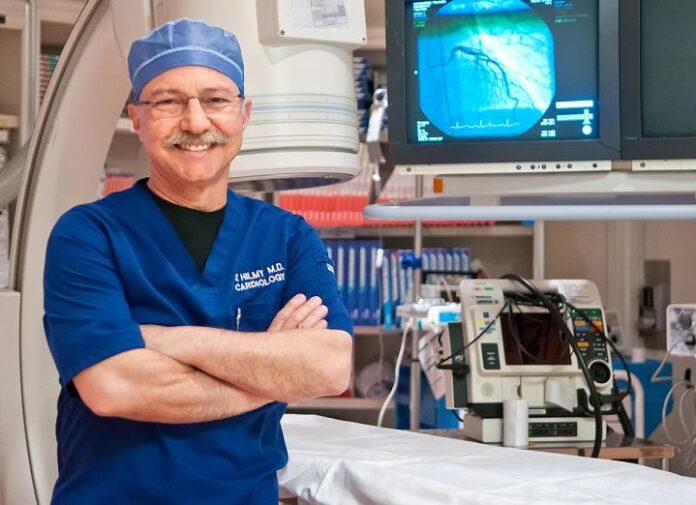HARLINGEN – One in every four deaths is linked to heart disease. It is the leading cause of death for both men and women.
Coronary Heart Disease (CHD) is the most common type of heart disease affecting Americans right now. More than 700,000 Americans will have a heart attack this year alone.
The most important defense against this disease is education and knowing when you need to act.
Harlingen Medical Center, a leader in cardiovascular care, in conjunction with National Heart Month (February), will devote a month-long series of its Doc Talk Lectures to some of the most important medical topics related to your heart – starting Wednesday, February 3, 2016, at 6:00 p.m., in the Harlingen Medical Center Medical Office Building (MOB) Conference Room, and it is open to the public.
“Heart disease can affect just about anyone. That includes adults and children,” said Linda Bull, Director of The Catheterization Laboratory at Harlingen Medical Center. “Heart disease knows no limits essentially because this is a condition that develops in the arteries. A substance called plaque builds up in the arteries and over time it can narrow an artery causing a reduction in the blood flow to the heart, which can lead to a heart attack.”
According to the Centers for Disease Control (CDC) and Prevention, symptoms of heart disease vary depending on the type of disease, which may include chest discomfort or a heart attack. Someone having a heart attack may experience several symptoms, including:
– Chest pain of discomfort that doesn’t go away within a few minutes.
– Pain or discomfort in the jaw, neck, or back.
– Weakness, light-headedness, nausea, or a cold sweat.
– Pain or discomfort in the arms or shoulder.
– Shortness of breath.
Heart disease can be managed and even prevented, declares the CDC. It’s all matter of knowing what you need to do – to keep the disease away.
The CDC summarizes that if you smoke, consume unhealthy food, and do not exercise (physical activity) – your chances of developing heart disease increase. But, if you do not smoke, maintain a healthy weight, eat a healthy diet, exercise regularly, you are less likely to develop the disease.
Heart disease refers to several types of heart conditions that include: coronary artery disease, malfunction of valves in the heart, the inability of the heart to pump correctly, and abnormal heart rhythms. And, this February, specialty physicians (cardiologist and electrophysiologist) from Harlingen Medical Center’s Cardiovascular Center will host heart-related educational lectures.
The first Doc Talk Lecture, scheduled for Wednesday, February 3rd, will feature one of the most experienced cardiologists in the region, Dr. Shereef Hilmy. His lecture, titled “Abdominal Aortic Aneurysm” will define what this condition is, how you can identify it ahead of a serious medical issue, and how it can be treated.
The second Doc Talk Lecture, scheduled for Thursday, February 11th, will feature a well sought after cardiologist, Dr. Eduardo Flores. His lecture will spotlight the usage and need for the world’s smallest heart pump, the “Impella® 2.5 Catheter.” The Impella® 2.5 Catheter is a blood pump that creates a vortex inside the heart chamber by moving blood from the heart and out to the rest of the body. His lecture will clarify how this tiny pump is helping patients survive needed surgery.
The third Doc Talk Lecture, scheduled for Wednesday, February 17th, will feature the only, highly-experienced, electrophysiologist in Cameron County, Dr. Frank Mazzola.
His lecture, titled “Abnormal Heart Rhythms” will define what this condition is, how you can identify it in advance of a serious medical issue, and the treatment options available, right here, at Harlingen Medical Center.
The last and fourth Doc Talk Lecture, scheduled for Wednesday, February 24th, will feature Dr. Juan Villarreal, a Harlingen dentist and Partner-In-Care to Harlingen Medical Center. His lecture will make the connection between a healthy mouth and a healthy heart, including how a dental appliance can help prevent sleep apnea.
Heart disease, generally, may be diagnosed in your primary care physician’s office, according to the CDC.
Your family physician can perform a chest X-ray, coronary angiogram, electrocardiogram (EKG), and exercise stress test. But, you must discuss, with your physician, which test is right for you.
The Cardiovascular Center at Harlingen Medical Center offers progressive treatments for cardiovascular disease.
The award-winning and nationally recognized hospital specializes in the diagnosis and treatment of cardiac patients. It features a top-ranked heart team, which includes cardiologists, an electrophysiologist, and cardiothoracic surgeons, that provides minimally-invasive diagnostic testing and treatment, as well as advanced cardiac and vascular interventions, such as angioplasty, stenting, cardiac ablation, open heart surgery, minimally invasive heart valve repair and replacement, and coronary artery bypass graft.




